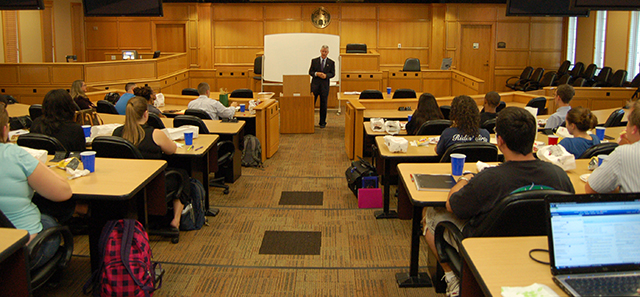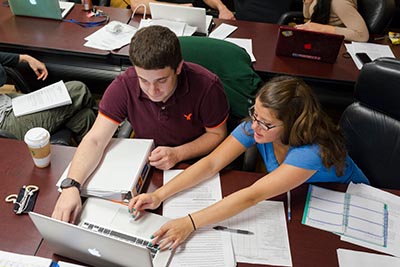Becoming a Competitive Law School Applicant
Your law school application will be evaluated by law school admission boards on a variety of objective and subjective criteria.
While law school applicants must submit a variety of documentation, objective measures are considered the most significant determinate for acceptance or rejection. Objective measures such as Law School Admission Test (LSAT) scores and cumulative grade point average (GPA) are weighed the most heavily. Law schools often rely on an "index" score that is a weighted combination of your LSAT score and GPA to decide whom to reject or admit. While law schools may vary on how much weight is assigned to your LSAT score and GPA, both measures are used to evaluate your potential success as a student of law.

LSAT
The LSAT is a half-day standardized test that will measure and score your reading comprehension skills and reasoning skills (analytical and logical reasoning). The unscored portion of the exam includes a writing sample and a standardized experimental questions section. LSAT scores range from 120 to 180 points. In general, a score of 151 is considered the 50th percentile. You may take the LSAT more than once and law schools will consider the highest LSAT score.
The test is required by all American Bar Association (ABA) approved law schools and many non-ABA-approved law schools. The LSAT is offered four times per year. The Law School Admissions Council (LSAC) will provide you with approaching test dates and information regarding registration, fees, testing locations and sample tests. While you are not required to know the "law" for this exam, advance preparation is essential.
LSCA has a list of approved LSAT preparation providers including their partnership with Khan Academy to offer a free preparation program.
GPA

Law schools consider your cumulative grade point average for every class taken from every institution attended. Pre-Law students should be aware that law schools often compute GPA from all grades received even if you have re-taken a course. While maintaining a perfect 4.0 GPA in college may be unrealistic for some, a strong effort should be made to keep GPA high.
Students in the Pre-Law program should take advantage of university resources to prepare and maintain academic success:
While GPA and LSAT scores are important, they are not the only criteria used by law schools when deciding admissions. The goal of most law schools is to admit the best possible students among thousands of applicants. Law schools also consider evidence of personal qualities such as work ethic, judgment and commitment that are demonstrated inside and outside the classroom. According to the American Bar Association, law schools look for well-rounded individuals that demonstrate some of the following attributes:

Personal Qualities
- Sound judgment
- Integrity
- Work ethic
- Motivation
- Values and ideals
Academic Qualifications
- Research skills
- Critical thinking skills
- Writing skills
- Organizational and
time-management skills - Nature and rigor
of course selection - Grade distribution
Non-Academic Qualifications
- Work experience (jobs, internships)
- Leadership and Student Organization Involvement
- Community Engagement
- Research
- Study Abroad
This information should be conveyed through your personal statement and letters of recommendation.
Personal Statement
Almost all law schools require applicants to write a personal statement. In general, admission boards will assess the statement to determine the applicant's interest and fit for studying and practicing law. Personal statements should be well written and concise in offering specific evidence of achievement and competence. Consult with experts in Stetson's Career Success for help in writing and honing your statement.
Letters of Recommendation
Most law schools require applicants to obtain letters of recommendation from professors and employers that will attest to an applicant's academic and personal strengths. Letters should be requested from professors and employers with whom you have had significant contact. Take advantage of the close student-faculty commitment that is offered by Stetson in order to network and build strong academic relationships.
Law School Admission Council (LSAC): The Law School Admission Council offers the Credential Assembly Service (CAS), which centralizes and standardizes undergraduate records to simplify the law school admission process. CAS stores and distributes student academic materials including transcripts, writing samples, personal statements and LSAT scores. Most ABA approved schools require law student applicants to register with CAS.

Law school admission boards consider a wide range of extracurricular and curricular activities including work experience, internships, and involvement with clubs and associations. Stetson offers many opportunities for Pre-Law students to develop experiences that build relevant skill sets including leadership.
Phi Alpha Delta
A student organization, Phi Alpha Delta, provides exposure and insight to the practice of law. PAD is a co-sponsor of the Law School Fair and members organize special meetings and events to advance the knowledge of students in Pre-Law.
Mock Trial Team
The Stetson Undergraduate Mock Trial Team is now a group of about 20 undergraduate students and three coaches. We have 2 teams that compete under the American Mock Trial Association (AMTA), going head-to-head against other universities from all across the United States.
The Washington Semester
Select juniors and seniors may study the political process in Washington, D.C., through a program hosted at American University. Students are given full credit toward their degree for participation in the program. Scholarship assistance is available through a special fund endowed by U.S. Sen. Max Cleland, a 1964 graduate of Stetson.
Study Abroad
Stetson's WORLD: International Learning administers a program of foreign study designed to expose students, first-hand, to a country's language, literature, history, social institutions and artistic and scientific development. Opportunities for learning are available in multiple locations across the globe.
Model Senate
The Model Senate program is a three-day event, hosted by Stetson, that draws students from several universities in the eastern United States. Offered each spring, the program includes committee hearings, where students introduce bills which they have researched, and Senate sessions, where the bills passed in committee are presented to the full Senate.

Senior Project
Students in the College of Arts and Sciences are required at the end of their course work to complete a senior research project that serves as a capstone experience. Students may wish to consider discussing their research and writing of this substantial project with the Pre-Law adviser.
Internships
The Pre-Law Advisory Committee strongly recommends a formal internship in the legal field. Students are assisted in arranging internships by the Pre-Law Advisory Committee and through individual departments. Stetson's Career Success also offers a wide range of internships that are continually updated throughout the year.
Service Opportunities
The Center for Community Engagement provides students with many challenging community engagement opportunities that promote experiential learning, social responsibility and leadership development.